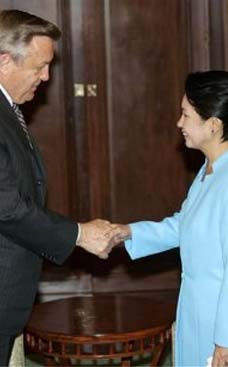2007.07.08: July 8, 2007: Headlines: COS - Sierra Leone: Energy: Pueblo Chieftain: Sierra Leone RPCV Eric R. Green writes: Will the coming oil crisis be the end of suburbia?
Peace Corps Online:
Directory:
Sierra Leone:
Peace Corps Sierra Leone :
Peace Corps Sierra Leone: Newest Stories:
2007.07.08: July 8, 2007: Headlines: COS - Sierra Leone: Energy: Pueblo Chieftain: Sierra Leone RPCV Eric R. Green writes: Will the coming oil crisis be the end of suburbia?
Sierra Leone RPCV Eric R. Green writes: Will the coming oil crisis be the end of suburbia?

Every semester I’ve shown “End of Suburbia” to my classes to mixed reviews to the message. I’ve warned them that it will be too expensive for most Americans to own big trucks or SUVs, especially at the current way they are made to consume gas. This means our lives are going to change dramatically. Predicting social change can be difficult, especially for long-term future. The worst-case scenario is the total decline in our economy with a depression, social disorder and wars between states and communities for the remaining sources, much like the CBS TV action series “Jericho” in which residents of a small Kansas town are cut off from the rest of the world after major terrorist attacks. The best-case scenario is that we have minor inconveniences and we find ways to use energy more efficiently and wisely. Alternative energy sources will need to be developed to their full potential, out of necessity, like wind and solar. Whatever happens there is one truth that many Americans will have to face. We must change our lifestyles. We cannot continue to use natural resources the same way we have in the past and present.
Sierra Leone RPCV Eric R. Green writes: Will the coming oil crisis be the end of suburbia?
Will the coming oil crisis be the end of suburbia?
By ERIC R. GREEN
LAMAR COMMUNITY COLLEGE
Eric R Green is the library director at Lamar Community College and an adjunct sociology instructor. He served as a Peace Corps volunteer in Sierra Leone, West Africa.
Three years ago, when I started to teach Introduction to Sociology for Lamar Community College, my brother sent me the DVD, “The End of Suburbia: Oil Depletion and the Collapse of the American Dream,” concerning the “coming oil crisis."
I showed it to my class to help the students better understand “social change” and what would happen to society during such a crisis. They hadn’t even heard that we were going to face such a crisis. It’s no surprise, most Americans hadn’t heard of it either; that was three years ago.
Today, the mainstream media are beginning to wake up to what geologists and environmentalist have been warning us for years.
We have reached “Peak Oil.” The demand for oil has outreached the supply and there are no new cheap alternatives. We have many years of oil left; this just means that it’s going to get a lot more expensive because of demand. We think $3 a gallon is bad now; it could possibly go up to $10 a gallon in a few years, even more.
This will be a world crises and not just an American one. Countries like Brazil, which is self-sufficient in energy, will weather this crisis much better than most. Even poorer counties of the Third World, who use less oil, will be able to adapt to living simpler.
Every semester I’ve shown “End of Suburbia” to my classes to mixed reviews to the message. I’ve warned them that it will be too expensive for most Americans to own big trucks or SUVs, especially at the current way they are made to consume gas.
This means our lives are going to change dramatically. Predicting social change can be difficult, especially for long-term future. The worst-case scenario is the total decline in our economy with a depression, social disorder and wars between states and communities for the remaining sources, much like the CBS TV action series “Jericho” in which residents of a small Kansas town are cut off from the rest of the world after major terrorist attacks.
The best-case scenario is that we have minor inconveniences and we find ways to use energy more efficiently and wisely.
Alternative energy sources will need to be developed to their full potential, out of necessity, like wind and solar. Whatever happens there is one truth that many Americans will have to face. We must change our lifestyles. We cannot continue to use natural resources the same way we have in the past and present.
In the last 60 years, the United States, only 5 percent of the world’s population, has used as much natural resources as of all of human history combined! This lifestyle change does not sit well with my Generation X and Y students, and I guess it will not sit well with most Americans.
Is there a political solution? With the national election coming up in 2008, some of the presidential candidates in both parties are talking about energy policy and this crisis, but few are telling us that we have to give up our lifestyles and big SUVs.
Even if it’s the truth, who is going to vote for a candidate who tells us we have to live with less in the future? What we will need is a “World War II kind of effort” to deal with this issue just like the “greatest generation” that had to deal with in personal sacrifice and rationing of goods and services. Our current greedy culture stresses individuality above all so the psychological aspects of this type of change will be one of our biggest challenges.
One question my students always ask is, “So what about this crisis in suburbia? I live in a rural community, how will this affect my life?” Well, first farming will become more expensive. Using gas guzzling tractors and machinery may not be affordable. Farming will become more labor intensive and most Lamar town residents will have to grow some of their food in their backyards and in community gardens.
Rural people will have to make most of their clothing locally along with many other items, which in turn will boost the local economy and create many jobs. Many people in cities like Denver, where I lived for 20 years, will be looking to get out to towns like Lamar, where transportation and living cost are less. For all rural and urban areas, cheap imports from countries like China will become too expensive to ship, but smaller family-owned stores will be making a comeback, with more locally grow food and made goods.
I also give my students one final challenge: “If in 22 years, when I hope to retire, come find me in the nursing home or hippie commune and if gas prices are still about $3 a gallon or less, I’ll take you out to lunch." Of course, I warn them even if gas is cheap and we are using fossil fuels at the same levels or even somewhat less amounts, we will still be facing an even bigger threat: “global warming.”
Links to Related Topics (Tags):
Headlines: July, 2007; Peace Corps Sierra Leone; Directory of Sierra Leone RPCVs; Messages and Announcements for Sierra Leone RPCVs; Energy; Peace Corps Library; Peace Corps Directory; Peace Corps History; Bulletin Board; Recent Peace Corps News
When this story was posted in July 2007, this was on the front page of PCOL:





Peace Corps Online The Independent News Forum serving Returned Peace Corps Volunteers
 | Dodd issues call for National Service
Standing on the steps of the Nashua City Hall where JFK kicked off his campaign in 1960, Presidential Candidate Chris Dodd issued a call for National Service. "Like thousands of others, I heard President Kennedy's words and a short time later joined the Peace Corps." Dodd said his goal is to see 40 million people volunteering in some form or another by 2020. "We have an appetite for service. We like to be asked to roll up our sleeves and make a contribution," he said. "We haven't been asked in a long time." |
 | Public diplomacy rests on sound public policy
When President Kennedy spoke of "a long twilight struggle," and challenged the country to "ask not," he signaled that the Cold War was the challenge and framework defining US foreign policy. The current challenge is not a struggle against a totalitarian foe. It is not a battle against an enemy called "Islamofascism." From these false assumptions flow false choices, including the false choice between law enforcement and war. Instead, law enforcement and military force both must be essential instruments, along with diplomacy, including public diplomacy. But public diplomacy rests on policy, and to begin with, the policy must be sound. Read more. |
 | Ambassador revokes clearance for PC Director
A post made on PCOL from volunteers in Tanzania alleges that Ambassador Retzer has acted improperly in revoking the country clearance of Country Director Christine Djondo. A statement from Peace Corps' Press Office says that the Peace Corps strongly disagrees with the ambassador’s decision. On June 8 the White House announced that Retzer is being replaced as Ambassador. Latest: Senator Dodd has placed a hold on Mark Green's nomination to be Ambassador to Tanzania. |
 | Peace Corps Funnies
A PCV writing home? Our editor hard at work? Take a look at our Peace Corps Funnies and Peace Corps Cartoons and see why Peace Corps Volunteers say that sometimes a touch of levity can be one of the best ways of dealing with frustrations in the field. Read what RPCVs say about the lighter side of life in the Peace Corps and see why irreverent observations can often contain more than a grain of truth. We'll supply the photos. You supply the captions. |
 | PCOL serves half million
PCOL's readership for April exceeded 525,000 visitors - a 50% increase over last year. This year also saw the advent of a new web site: Peace Corps News that together with the Peace Corps Library and History of the Peace Corps serve 17,000 RPCVs, Staff, and Friends of the Peace Corps every day. Thanks for making PCOL your source of news for the Peace Corps community. Read more. |
 | Suspect confesses in murder of PCV
Search parties in the Philippines discovered the body of Peace Corps Volunteer Julia Campbell near Barangay Batad, Banaue town on April 17. Director Tschetter expressed his sorrow at learning the news. “Julia was a proud member of the Peace Corps family, and she contributed greatly to the lives of Filipino citizens in Donsol, Sorsogon, where she served,” he said. Latest: Suspect Juan Duntugan admits to killing Campbell. Leave your thoughts and condolences . |
 | Warren Wiggins: Architect of the Peace Corps
Warren Wiggins, who died at 84 on April 13, became one of the architects of the Peace Corps in 1961 when his paper, "A Towering Task," landed in the lap of Sargent Shriver, just as Shriver was trying to figure out how to turn the Peace Corps into a working federal department. Shriver was electrified by the treatise, which urged the agency to act boldly. Read Mr. Wiggins' obituary and biography, take an opportunity to read the original document that shaped the Peace Corps' mission, and read John Coyne's special issue commemorating "A Towering Task." |
 | Chris Dodd's Vision for the Peace Corps
Senator Chris Dodd (RPCV Dominican Republic) spoke at the ceremony for this year's Shriver Award and elaborated on issues he raised at Ron Tschetter's hearings. Dodd plans to introduce legislation that may include: setting aside a portion of Peace Corps' budget as seed money for demonstration projects and third goal activities (after adjusting the annual budget upward to accommodate the added expense), more volunteer input into Peace Corps operations, removing medical, healthcare and tax impediments that discourage older volunteers, providing more transparency in the medical screening and appeals process, a more comprehensive health safety net for recently-returned volunteers, and authorizing volunteers to accept, under certain circumstances, private donations to support their development projects. He plans to circulate draft legislation for review to members of the Peace Corps community and welcomes RPCV comments. |
 | He served with honor
One year ago, Staff Sgt. Robert J. Paul (RPCV Kenya) carried on an ongoing dialog on this website on the military and the peace corps and his role as a member of a Civil Affairs Team in Iraq and Afghanistan. We have just received a report that Sargeant Paul has been killed by a car bomb in Kabul. Words cannot express our feeling of loss for this tremendous injury to the entire RPCV community. Most of us didn't know him personally but we knew him from his words. Our thoughts go out to his family and friends. He was one of ours and he served with honor. |
 | History of the Peace Corps
PCOL is proud to announce that Phase One of the "History of the Peace Corps" is now available online. This installment includes over 5,000 pages of primary source documents from the archives of the Peace Corps including every issue of "Peace Corps News," "Peace Corps Times," "Peace Corps Volunteer," "Action Update," and every annual report of the Peace Corps to Congress since 1961. "Ask Not" is an ongoing project. Read how you can help. |
Read the stories and leave your comments.

Some postings on Peace Corps Online are provided to the individual members of this group without permission of the copyright owner for the non-profit purposes of criticism, comment, education, scholarship, and research under the "Fair Use" provisions of U.S. Government copyright laws and they may not be distributed further without permission of the copyright owner. Peace Corps Online does not vouch for the accuracy of the content of the postings, which is the sole responsibility of the copyright holder.
Story Source: Pueblo Chieftain
This story has been posted in the following forums: : Headlines; COS - Sierra Leone; Energy
PCOL38063
75




















